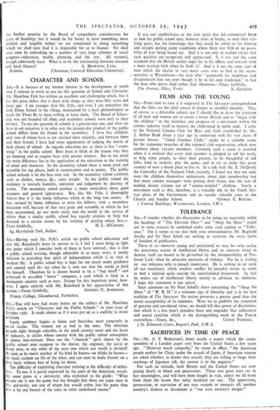Sitt,—You will have had many letters on the subject of
Mr. Hamilton Fyfe's article on " Character and the Public Schools " in your issue of October 15th. It reads almost as if it were put up as a cockshy to invite criticism.
Surely snobbery begins at home and flourishes most rampantly in social circles. The 'women are as bad as the men. The infection spreads right through suburbia, in the small country town and the heart of industry, in circles whose contact with the public school atmosphere is almost non-existent. Does not the " clannish " spirit shown by the public school man reappear in the doctor, the engineer, the naval or Army man, or any other of the sects into which our world is divided? As soon as he meets another of his kind he knows—or thinks he knows— the basic outlook on life of the other, and can start to make friends on a firm basis without fear of being let down.
The difficulty of explaining character training is the difficulty of defini- tion. To me, it is partly expressed by the .story of the American, watch- ing some game at a university, who explained to his guide: "What amazes me is not the game, but the thought that there are 2,000 men in this university, not one of whom but would rather lose his game than win it by any breach of the rules or other underhand means." It was not snobbishness or the clan spirit that led commercial firms to look for public school men, however short of brains, to man their out- lying posts, but the knowledge that they could be relied on for honesty and straight dealing under conditions where there was little or no possi- bility of ever being found out. And it is not only in exalted circles that such qualities are recognised and appreciated. Is it not just the same standard that the British soldier looks for in his officer, and rewards with a most trusting faith when he finds it? And is it not the same type of man which the elector in very many cases tries to find as his repre- sentative at Westminster—the man who " promiseth his neighbour and disappointeth him not even though it be to his own hindrance," in fact the man who serves God rather than Mammon.—Yours faithfully,


























 Previous page
Previous page